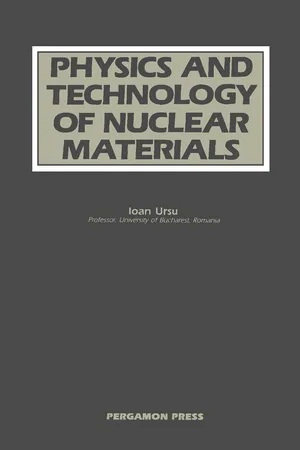
- 540 pages
- English
- PDF
- Available on iOS & Android
Physics and Technology of Nuclear Materials
About This Book
Physics and Technology of Nuclear Materials presents basic information regarding the structure, properties, processing methods, and response to irradiation of the key materials that fission and fusion nuclear reactors have to rely upon. Organized into 12 chapters, this book begins with selectively several fundamentals of nuclear physics. Subsequent chapters focus on the nuclear materials science; nuclear fuel; structural materials; moderator materials employed to ""slow down"" fission neutrons; and neutron highly absorbent materials that serve in reactor's power control. Other chapters explore the cooling agents; fluids carrying the energy to its final stage of conversion into electric power; thermal and biological shielding materials; some outstanding reactor components; and irradiated fuel reprocessing. The last two chapters deal with nuclear material quality inspection by destructive and non-destructive methods, and specific materials envisaged for use in future thermonuclear reactors. This monograph will be helpful for a wide range of specialists wishing to gear their research and development, education, and other activities toward the field of nuclear power and nuclear technology.
Frequently asked questions
Information
Table of contents
- Front Cover
- Physics and Technology of Nuclear Materials
- Copyright Page
- Table of Contents
- Preface
- INTRODUCTION
- CHAPTER 1. ELEMENTS OF NUCLEAR REACTOR PHYSICS
- CHAPTER 2. STRUCTURE AND PROPERTIES OF MATERIALS
- CHAPTER 3. FUEL MATERIALS
- CHAPTER 4. STRUCTURAL MATERIALS
- CHAPTER 5. MODERATOR MATERIALS
- CHAPTER 6. MATERIALS FOR REACTOR REACTIVITY CONTROL
- CHAPTER 7. COOLANT MATERIALS
- CHAPTER 8. SHIELDING MATERIALS
- CHAPTER 9. NUCLEAR FUEL ELEMENTS
- CHAPTER 10. NUCLEAR MATERIAL RECOVERY FROM IRRADIATED FUEL AND RECYCLING
- CHAPTER 11. QUALITY CONTROL OF NUCLEAR MATERIALS
- CHAPTER 12. MATERIALS FOR FUSION REACTORS
- Appendix 1: Equivalence of some usual measurements units to those in the International System (IS)
- Appendix 2: Characteristics of major reactor types
- Appendix 3: Fuel material enrichment for various types of reactors
- Appendix 4: Electronic configuration of elements
- Appendix 5: Some properties of elements
- Appendix 6: Irradiation testing of structural materials for CANDU - 600 nuclear power station
- Appendix 7: Neutron cross-sections
- Appendix 8
- Appendix 9: The main fission products of thermal neutrons-irradiated uranium, which determine the fuel radioactivity
- Appendix 10: Crystalline structures and magnetic properties of some uranium compounds
- Appendix 11: Properties of materials, of chief interest in fuel element design
- Appendix 12: Nuclear reactors types and net electric power, as registered at the International Atomic Energy Agency
- Appendix 13: Hydrometallurgy of uranium
- Appendix 14: Nuclear fuel cycles
- Index